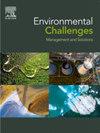Role of regulatory frameworks in plastic waste value chain and management
Q2 Environmental Science
引用次数: 0
Abstract
This study critically examines the impact of regulatory frameworks on the plastic waste value chain and its management, offering a comprehensive analysis of how different governmental policies shape the effectiveness of plastic waste processes from generation to recycling and disposal. This review explores the dynamics between regulatory approaches and their practical outcomes in plastic waste management via a systematic review of global legislation and case studies. This review further categorizes these frameworks into stringent, moderate, and lenient, correlating each category with corresponding outcomes in terms of plastic recycling rates, innovation in waste processing technologies, and sustainability practices. Furthermore, this review addresses the challenges and opportunities presented by Extended Producer Responsibility (EPR) schemes, and how this influences corporate behavior and technology adoption in the plastic industry. Additionally, this work synthesizes key factors that determine the success of regulatory frameworks in fostering a circular economy by leveraging data and findings from multiple sources. Finally, the research efforts in this study provides policy recommendations for enhancing the regulatory environment to better manage plastic waste and encourage the transition towards more sustainable practices. The conclusions drawn from this review not only shed light on effective strategies and gaps in current regulatory practices, but also offer a roadmap for policymakers, industry leaders, and environmental advocates to collaboratively improve the management of plastic waste globally. This study aims to serve as a foundational reference for future research and policy development in the realm of sustainable plastic waste management.
监管框架在塑料废物价值链和管理中的作用
本研究批判性地考察了监管框架对塑料废物价值链及其管理的影响,全面分析了不同的政府政策如何影响塑料废物从产生到回收和处置过程的有效性。本文通过对全球立法和案例研究的系统审查,探讨了塑料废物管理中监管方法与其实际成果之间的动态关系。本综述进一步将这些框架分为严格、适度和宽松,并将每个类别与塑料回收率、废物处理技术创新和可持续性实践方面的相应结果相关联。此外,本文还讨论了生产者责任扩展(EPR)计划带来的挑战和机遇,以及这如何影响塑料行业的企业行为和技术采用。此外,本工作通过利用来自多个来源的数据和发现,综合了决定监管框架在促进循环经济方面取得成功的关键因素。最后,本研究的研究成果为加强监管环境提供了政策建议,以更好地管理塑料废物,并鼓励向更可持续的做法过渡。本次审查得出的结论不仅揭示了当前监管实践中的有效战略和差距,还为政策制定者、行业领导者和环保倡导者提供了路线图,以共同改善全球塑料废物管理。本研究旨在为未来可持续塑料废物管理领域的研究和政策制定提供基础参考。
本文章由计算机程序翻译,如有差异,请以英文原文为准。
求助全文
约1分钟内获得全文
求助全文
来源期刊

Environmental Challenges
Environmental Science-Environmental Engineering
CiteScore
8.00
自引率
0.00%
发文量
249
审稿时长
8 weeks
 求助内容:
求助内容: 应助结果提醒方式:
应助结果提醒方式:


